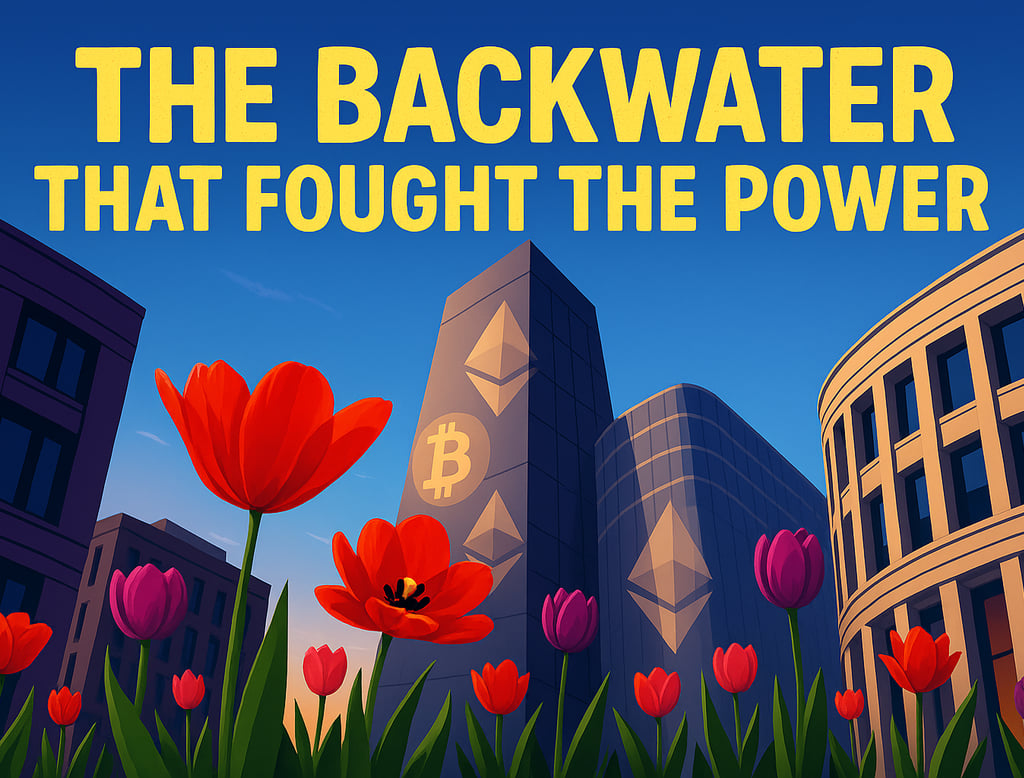Why Banking in Dallas Still Matters & What Can Crypto Learn From It.
Discover how the Federal Reserve's decentralized design, starting with cities like Dallas, defends the U.S. dollar, while revealing why decentralized assets like Bitcoin might be next in line. Learn, laugh, and get smarter about money with EasyDeFiCrypto.com.


The Backwater That Fought the Power
Back in the day, if you worked at Salomon Brothers and got shipped off to "equities in Dallas," it was basically the Wall Street equivalent of being told, "We love you, but… from a distance." It meant you weren't quite ready for the big leagues of New York at least not yet.
But the punchline? Dallas didn’t just accept its role it made it count.
As it turns out, Dallas became a strategic player in the grand chessboard of U.S. monetary power, not despite being far from New York, but because of it. And now, as crypto rises as an alternative to traditional finance, there's a valuable lesson here for us all.
Dallas: The OG of Decentralized Finance
In 1914, Dallas wasn’t exactly the financial powerhouse we know today. Heck, it wasn’t even in the top 50 U.S. cities by population. But when the Federal Reserve was being formed, someone had a brilliant (and surprisingly modern) idea: let's decentralize banking power.
That’s why Dallas, alongside 11 other cities, was chosen to house a regional Fed bank. The goal? Avoid centralizing everything in Wall Street or D.C., and instead, give regional economies their own voice. That structure is still in place today.
This wasn’t just ceremonial. These regional banks (yes, even the one in Dallas!) could set their own interest rates and acted semi-independently something almost unimaginable today. Fast forward, and even though national interest rates are now unified, every regional president still gets a seat (and vote) at the big table known as the FOMC.
Fast-Forward to 2025: Fiscal Chaos & the Fed’s Firewall
With today's headlines screaming about trillion-dollar deficits and budget bills that could add $56 trillion in debt (yep, with a T) over the next 30 years, the Fed stands as the last adult in the room.
The president can’t fire the Fed Chair (thanks to last week’s Supreme Court ruling), and Congress would have to rewrite core legislation to strip that independence away. That makes the Fed not Congress or the White House the final shield defending the dollar.
But let’s be real: if Congress keeps spending like a trust-fund baby with a stolen credit card, not even the Fed’s decentralization will be enough.
Enter: Bitcoin and Decentralized Finance (DeFi)
Here’s where it gets interesting: the rise of assets like Bitcoin isn’t random it’s a response. A response to governments that print money like it’s toilet paper, to inflation fears, and to centralized systems cracking under pressure.
Bitcoin, like the Dallas Fed, started off as the “weird outsider.” But just like Dallas earned its seat at the monetary table, Bitcoin and DeFi are now doing the same in global finance.
According to Statista, Bitcoin’s adoption rate in the U.S. alone jumped from 6% in 2020 to over 17% in 2024, with more than 420 million users globally. Meanwhile, gold and Bitcoin have both surged in recent weeks signaling people are hedging against what they see as a shaky dollar future.
Decentralization wins when trust in centralized systems breaks.
What You Should Take Away (and Why You Should Subscribe)
The story of “banking in Dallas” is more than just a quirky tale of Federal Reserve trivia. It’s a template for the future of finance. It proves decentralization works not just in crypto but even in the heart of U.S. banking.
And if you’ve made it this far, you’re clearly someone who wants to stay ahead of the curve (and the next Fed meeting).
👉 So do yourself a favor: Join the EasyDeFiCrypto.com email list and get ahead of the chaos, the confusion, and the capital shifts.**
We’ll keep it fun, fact-packed, and beginner-friendly always.
Because whether it’s the Dallas Fed or decentralized finance, one thing is clear: the future favors those who think beyond Wall Street.
As always I leave you with this " Invest for the long haul. Don't get to greedy and don't get to scared". -Shelby M.C. Davis.
